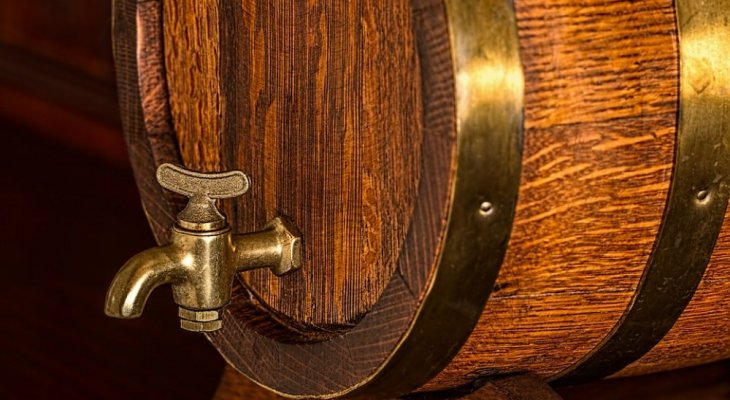How Long Does It Take to Brew Beer (Read It Here!)

If you are trying to get into homebrewing but a bit skeptic as to how much time of your day it will take, this blog post will help you gain a better understanding of how much time is required to successfully craft your own homebrewed beer.
How Long Does it Take To Brew Beer? From start to finish, homebrewing beer takes a minimum of 4 weeks. Different types of beer take longer to condition but will provide a higher quality beer in the end. Brewing beer is a hobby that can take up a lot of time depending on how detailed you want to be.
There is more to it than just the process itself when it comes to how long homebrewing takes. There is a variety of different methods that takes various amounts of time.
Read on as I dive deeper into how different homebrewing methods take and gain an understanding of which method fits your time schedule best.
Read Also: Reduce Your Brewing Time With A Proper Propane Burner
So, How Long Does It Take To Brew Beer?
Before you can even begin to make your own beer, you have to research how to actually do it so you don’t mess up.
This is rather easy for beginners these days since most kits now come with detailed manuals and complete ingredient kits. All you have to do is make sure you follow the instructions and don’t mess up the processes.
Spend a bunch of time researching and reading about people’s experiences before investing in any equipment.
TIP: Before you buy any equipment at all, check out different forums, reviews or ask any friends you might have in the area.
Make sure you buy kits and equipment that has positive feedback and suits your needs.
Don’t expect too much out of the low budget kits, they are mostly for the curious homebrewer who just wants to try it out and see if it is in their interest, which is why most beginner kits are very cheap.
Acquire the right equipment
Don’t go out and acquire a 20-gallon brewery kit for a thousand bucks before you’ve at least tried a cheaper and beginner-friendly kit. Brewing beer is pretty straight forward, but it’s not so simple once you try to develop more complicated formulas.
If you choose anything larger than a 1-gallon kit, make sure you have the necessary space available. A typical thing to use is either a shed in the garden or your garage, either works and should keep the spouse happy as you keep all your non-decorative equipment out of the way.
The time spent homebrewing starts off with the setup and mixing of ingredients.
Once you have acquired your equipment it is time to start the brewing process. Your first time will be longer than the following ones, simply because its a new area for you, and it takes a while to understand the different processes and how to handle them.
When setting up a brewing kit, make sure to follow any instructions that may come with the kit, and make sure to sanitize everything before starting.
Check out My Blog post “What Every Home Brewer Needs” for a huge guide to what equipment is needed for homebrewing!
Processes and varying in time
For the beer enthusiasts, the process of making your own beer can take a long time, but if you are just starting and want to craft some solid beer fast then you can.
The absolute minimum amount it takes to have a batch of beer ready is approximately four weeks. You make the batch and ferment it, which takes two weeks, and bottle conditioning takes another two weeks. This is the absolute minimum time it takes before you can enjoy your own homemade beer.
Different types of beer have different fermenting and conditioning times.
For example, an ale vs a lager beer has very different conditioning times. Ales are generally ready to drink after conditioning for two weeks in the bottle, whereas the lager has to condition four to six weeks to get the best results.
Homebrewing includes a large amount of idle waiting for your beer batches to condition properly. Patience is the hardest part of homebrewing, but once you get that first taste of your own beer creation, it will be worth it.
If you want to make high alcohol beer(7%+) you need to have a lot more patience.
The higher alcohol percentage beer process requires you ferment your beer a second time. The secondary fermentation isn’t just another two to six weeks but is recommended to be anywhere from nine months to a year.
So if you are aiming to craft these high alcohol beers, you need to prepare yourself for caring a lot more for your batches, as well as being a lot more patient.
There is no straight-up answer to how long the beer brewing process takes, it all depends on what type of beer you are brewing.
Both the preparation time before fermenting as well as the fermenting and following bottle conditioning all depends on what type of beer you are aiming to craft
To sum up, the answer to the question “How long does homebrew take?” is rather advanced. Before you ask this question, you need to ask yourself what type of beer you are aiming to craft.
Depending on which type of beer you choose, you will have various process times. The more advanced you get the longer the beer usually takes to finish.
Homebrewing is a craft where you have to be very patient, but it will be worth it once you get a nice taste of your own hard work.
Brewing times for Lager And Ale
The two most popular beer types to brew is Lager and Ale. These types of beer are fairly easy to mix and don’t require too much attention during the fermentation process.
NOTE: Once your beer has fermented, a rule of thumb is you should condition it in the bottle for a minimum of two weeks, but it is recommended to condition it for six weeks or more for better quality beer
If you want to know more on how long does it take to brew a lager, read this full post about the topic.
Light Ale:
A light ale beer is overall the fastest beer you can craft from start to finish. The fermentation process is usually two to three weeks. The bottle conditioning is recommended to be between two to four weeks.
Dark Ale:
Dark ale takes the longest out of the ales, with a fermentation time of four to six weeks. The bottling time can be anywhere from two weeks to several months.
Amber Ale:
An amber ale usually has a fermentation process of three to four weeks. This beer will become darker in color the longer you let it sit in the bottle. A minimum recommendation is bottle-conditioning for at least four weeks.
Light Lager:
The lager beers take much longer to finish than the Ales. A light lager requires fermentation of two to four months. The bottling of lagers is up to personal preference. The usual bottling time is anywhere from four weeks to several months.
Dark Lager:
Like the ales, the darker version of the lager takes a lot longer than the other lagers. The total fermentation is usually from ten months to a year. The bottling is the same as the light lager, anywhere from four weeks to several months.
Amber Lager:
The amber lager usually takes between four to six months. Bottling time is again a preference, but usually, people let the amber lager sit for a long time, anywhere from two months to a year.
NOTE: You can choose to craft beer with a higher alcohol percentage. This will add even more time to the process.
Read Also: What Is The Easiest Type Of Beer To Brew?



